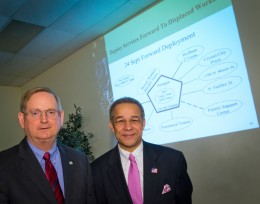
(L–R) Dan Kirkpatrick, a retired Air Force colonel and clinical instructor at the Wright State College of Nursing and Health, and Larry James, associate vice president of military affairs.
Psychologist Larry James, who led the effort to provide mental health services following the terrorist attack on the Pentagon, shared lessons learned with about 140 doctors, nurses, psychologists and other mental health professionals at a special disaster symposium.
James, Ph.D., associate vice president for military affairs at Wright State University, was a keynote speaker Nov. 15 for the session titled: “Dealing with Disaster: A Mental Health Perspective.”
The symposium was held at the Hope Hotel & Richard C. Holbrooke Conference Center at Wright-Patterson Air Force Base. It was sponsored by the Center for Disaster Mental Health, organized under the Wright State Research Institute.
A Boeing 757 hijacked by terrorists slammed into the side of Pentagon on Sept. 11, 2001, collapsing a portion of the building and killing 125 occupants. James was chairman of the psychology department at Walter Reed Army Medical Center and led teams of mental health professionals into the burning Pentagon.
From Sept. 11 through December, the teams provided psychological services near the Pentagon to victims of the attack and their families.
“It was a pretty intense operation,” said James. “The numbers were very, very daunting.”
The teams set up a family support center on the first three floors of the nearby Crystal City Sheraton Hotel to treat the children, spouses, parents and other relatives of those killed at the Pentagon.
James told the audience that psychological services to victims of a disaster should be close to where the traumatic event occurred, be offered quickly and that the victims should be filled with the hope of a positive outcome.
“We want the victims to return to their daily lives and get back to their normal routine as soon as possible,” James said.
Another topic of the symposium was the Boston Marathon bombings. Speaking on “The Boston Marathon Experience—A Personal Perspective” was Dr. Christina Hernon, an emergency room physician who was called to the finish line of the marathon to treat the injured. The explosion of two pressure-cooker bombs at the April 15 marathon killed three people and injured more than 260.
The symposium also included a panel discussion on vulnerable populations in disasters such as children, the elderly and the intellectual and developmentally delayed. There were also presentations on training for hostage situations and ethical dilemmas in disaster mental health.
More information on the National Center for Medical Readiness is available at www.med.wright.edu/medicalreadiness.

 Wright State alum Lindsay Aitchison fulfills childhood space-agency dream
Wright State alum Lindsay Aitchison fulfills childhood space-agency dream  Wright State business professor, alumnus honored by regional technology organizations
Wright State business professor, alumnus honored by regional technology organizations  Wright State University Foundation awards 11 Students First Fund projects
Wright State University Foundation awards 11 Students First Fund projects  Gov. DeWine reappoints Board Treasurer Beth Ferris and names student Ella Vaught to Wright State Board of Trustees
Gov. DeWine reappoints Board Treasurer Beth Ferris and names student Ella Vaught to Wright State Board of Trustees  Joe Gruenberg’s 40-Year support for Wright State celebrated with Honorary Alumnus Award
Joe Gruenberg’s 40-Year support for Wright State celebrated with Honorary Alumnus Award 